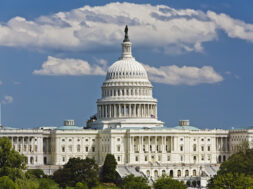Middle-Market Public Policy Roundup
Large portions of the stimulus package are devoted to helping small and midsize companies, the HFSC sent a letter to the Treasury, and the SEC resumes committee meetings.

In this week’s roundup, we look at the multitrillion-dollar stimulus package signed by President Donald Trump on Friday, large portions of which are devoted to help small and midsize companies. We also summarize a letter sent by the House Committee on Financial Services to the Treasury Department about distributing stimulus dollars, and we preview the upcoming Securities and Exchange Commission committee meetings that will address concerns over the coronavirus outbreak.
Large Portions of Pandemic Stimulus Earmarked for SMEs
While billions will go to bailing out big companies hurt by the COVID-19 pandemic, large portions of the stimulus package signed by President Donald Trump on Friday are earmarked for small and midsize enterprises.
The Coronavirus Aid, Relief, and Economic Security Act, known as the CARES Act, provides $2.2 trillion in emergency assistance to individuals, families and businesses affected by the COVID-19 pandemic, with provisions that could expand the amount to $6.2 trillion, the president said in a statement.
“The legislation developed in the Senate is the first step to restoring confidence and stability to America’s economy,” he said.
About $46 billion of the record-breaking CARES stimulus is targeted at distressed, industry-specific and essential companies, including airlines and businesses critical to maintaining national security. However, the rescue package provides nearly $454 billion for the Treasury Department to lend to midsize companies, which it defines as having between 500 and 10,000 employees, according to a summary from law firm Haynes and Boone.
This nearly half-trillion-dollars in financing, known as (B)(4) funds, will be dispersed to U.S.-based companies by the Treasury and the Federal Reserve in the form of low-interest loans.
Companies applying to receive federal relief under this provision must agree to multiple conditions, including a prohibition on dividend payments and stock buybacks, agreement to maintain 90% of their workforce, and a cap of $3 million on executive pay during the life of the loan.
While the federal government is still preparing the program, the loans will be first-come, first-served. Requests must be submitted by Dec. 31 at participating FDIC banks and other lenders.
Small companies will also receive emergency advances, which are designed to help them make payroll during the crisis.
The CARES Act sets aside $349 billion to provide short-term aid to companies with fewer than 500 employees for paycheck protection programs. The funds are distributed through the Small Business Administration’s 7(a) program.
To qualify, companies must prove the funds will be used to retain workers and cover payroll, lease and utility payments.
The legislation provides loans of up to $10 million or 250% of an employer’s average monthly payroll.
The loans will be made available through FDIC banks. Unlike other SBA loans, the 7(a) program does not require small companies to seek other sources of capital, including equity and debt, before funding is distributed.
The program is expected to launch as early as April 3, and the deadline to apply for a 7(a) loan is June 30.The Treasury and Federal Reserve are expected to offer additional guidance in coming weeks and will provide more information about CARES Act funding to small and midsize companies.
Although the program is designed to support small U.S. businesses, many lower middle-market companies backed by private equity may not be able to participate in the program in its current form.
The program stipulates that firms must have fewer than 500 employees in order to qualify. Yet under the so-called “affiliation rule,” employment is calculated based on the total number of employees across the private equity firm’s portfolio, placing many small PE-backed businesses above the qualifying employment threshold.
On March 30, ACG sent a letter to Treasury Secretary Steven Mnuchin asking that the department clarify that small businesses with equity investors will not be excluded from the 7(a) loan program.
ACG President and CEO Tom Bohn discussed private equity firms finding relief in the new stimulus package with the Wall Street Journal on April 1.
Bohn also discussed the package with Rep. Steven Horsford, D-Nev., and what it means for PE-backed companies and the middle market in an interview published this week.
Financial Services Committee Will Closely Monitor CARES Act: Rep. Waters
The House Committee on Financial Services said it would monitor the implementation of the multitrillion-dollar aid package to help Americans deal with the fallout of the coronavirus.
The committee’s chairwoman, Rep. Maxine Waters, D-Calif., sent a letter to Treasury Secretary Mnuchin, urging him to ensure that the CARES Act benefits those it was intended to help.
“Fulfill your duties and exercise your discretion in a manner that ensures these funds are solely used to protect workers, families, and the national economy,” she said.
The chairwoman outlined provisions that she and the committee included in the recently passed legislation, such as the requirement that federal aid provided to corporations have appropriate conditions placed on that funding. She called on Mnuchin to use the authority provided to him by Congress responsibly.
The CARES Act creates several oversight entities, including the Special Inspector General for Pandemic Recovery, a new watchdog office that will scrutinize the disbursement of nearly $500 billion to aid U.S. businesses.
SEC Committees Resume Meetings
The Securities and Exchange Commission announced that its Small Business Capital Formation Advisory Committee will host a meeting via video conference on April 2 in response to the challenges small businesses are facing in coping with COVID-19.
Committee Chair Carla Garrett and Vice Chair Jeff Solomon called for an ad hoc meeting on April 2, recognizing the extreme situation facing small businesses nationwide.
During the meeting, members will share observations from their areas of the marketplace and discuss how the committee and the commission can help small businesses address their short-term capital needs.
The SEC’s Investor Advisory Committee will also meet on April 2 after its March meeting was canceled due to the coronavirus outbreak.
The committee will discuss the impact of the coronavirus pandemic on investors and its implications.

Benjamin Glick is ACG Global’s marketing and communications associate.


